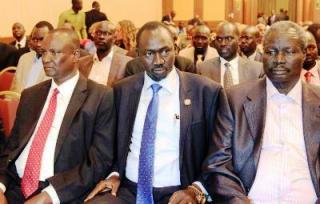S. Sudan rebels seek political reforms to build new nation
By Tesfa-Alem Tekle
February 24, 2014 (ADDIS ABABA) – South Sudanese rebels group – the SPLM-in-Opposition on Monday said it hopes the new round of peace talks in neighbouring Ethiopia will secure the political and security sector reforms needed to build a viable nation.

He further said that for peace to prevail, there is a need for a more comprehensive political process, which will be inclusive and transparent with the participation of all the diverse sections of South Sudanese society to redraw their political destiny.
Deng who is not a member of the rebel negotiating team said the constitution must be reviewed to establish a system which reflects the aspirations and expectations of the people of South Sudan.
The rebel official said they were looking to establish a “new South Sudan” where there was no discrimination based on ethnicity and political views, as well as no corruption, nepotism or tribalism.
“We [SPLM/A-In-Opposition] want to build a new nation where there is human dignity and respect for human rights as well as rule of law and justice,” said Deng.
He further stressed that their vision was for the country to have checks and balances between the four arms of government.
“Federal Democracy will be an ideal system of governance in South Sudan like it is in Ethiopia, United States of America and elsewhere in the world,” the official told Sudan Tribune from the Ethiopian capital.
“A national reconciliation and healing process will be a corner stone in the New South Sudan and we will embark on this process with genuine intentions and commitment to bring our communities which were devastated by the communal conflicts and cattle raiding among themselves,” he added.
Both the rebels and government forces have been accused of committing atrocities over the last two months, with an estimated 10,000 killed, over 700,000 internally displaced and almost 150,000 forced to flee to neighbouring countries.
The second round of talks between the two warring factions was yet to resume after negotiators representing rebel leader, Riek Machar insisted that Uganda withdraws its forces from South Sudan before the new round of talks begin.
“There will be no peace in South Sudan with UPDF [Uganda Peoples Defense Forces] taking part in active combat,” Deng emphasised.
He, however, told Sudan Tribune that the deployment of the African Capacity Crisis Response proposed by the African Union had nothing to do with UPDF.
“We will not accept participation of UPDF in any peace keeping mission in our territory,” Deng said, adding, “They are hostile forces and we consider them as an occupation force”.
The rebels opposed to President Salva Kiir have clearly stated that they would not accept any international force to be deployed in South Sudan other than the UN peace keeping mission already operating the world’s youngest nation.
The two warring parties signed a cease fire agreement in Addis Ababa on 23 January, although the peace pact did not stop actual fighting on ground.
According to East African mediators from Intergovernmental Authority on Development (IGAD), the proposed agenda for the talks includes; social and humanitarian; security, political and governance; constitutional review and reform; national reconciliation and healing; as well as reform and review of the civil services.
Sudan Tribune understands that both sides have responded to IGAD’s draft proposal.
(ST)
